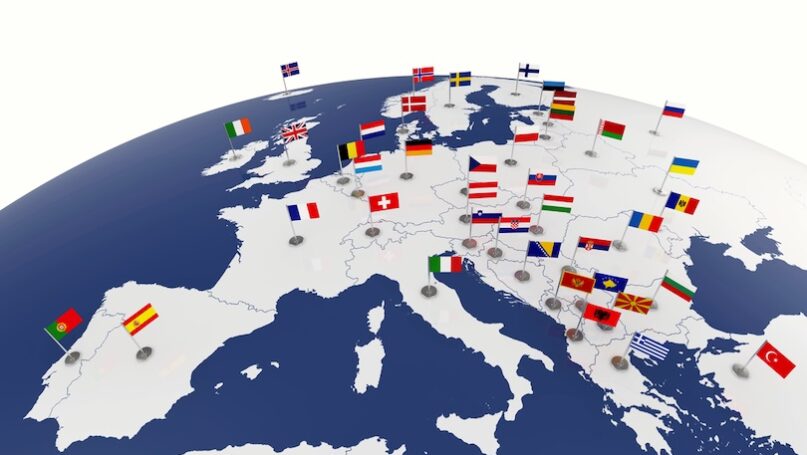
denrud/Depositphotos
Across Europe, right-wing leaders are borrowing from Donald Trump’s playbook, with slogans like “Poland First,” “Make Romania Great Again,” and “Make Albania Great.” What began as a domestic political trend in the United States has evolved into a transnational movement among right-wing forces. In Washington, current and former key figures in Trump administration openly backed like-minded candidates abroad, including Poland and Albania. In Europe, Romanian far-right opposition party leader George Simion endorsed a Polish nationalist presidential candidate, while Hungarian Prime Minister Viktor Orbán signaled his backing for Simion himself. “My country first” has become a standard rallying cry of an emerging alliance. But the rise of what might be called a “nationalist international” raises important questions: What, if anything, unites these movements across borders? And can politics radically and exclusively root in national primacy ever be meaningfully transnational?
A closer look at the policy platforms among Europe’s radical right-wing parties reveals a fragmented reality. While many share similar ideologies, such as anti-globalism, anti-elitism, and hostility to supranational institutions, deep divisions persist when it comes to national interests, both domestically and between states.
Looking back to early 2025, the return of Trump to the White House in 2025 was welcomed with fanfare by many of Europe’s political right. In February 2025, the far-right group Patriots for Europe (PfE) convened its inaugural summit in the European Parliament. Marine Le Pen of France’s National Rally expressed the gathering as a “renaissance.” Orbán was blunter: “An era has ended. We were heretics yesterday, but today we are the mainstream.” Despite disruptive trade and foreign policy measures from Washington, Orbán’s posture remained largely unchanged. At the May 2025 Conservative Political Action Conference (CPAC) in Budapest, Orbán again praised Trump for “giving hope back to the world.”
The admiration runs both ways. In Germany’s general election, Alice Weidel of Alternative for Germany (AfD) joined a social media discussion with Elon Musk, then head of the U.S. Department of Government Efficiency, who publicly endorsed the AfD. In Poland, U.S. Homeland Security Secretary Kristi Noem attended CPAC Warsaw and endorsed right-wing historian Karol Nawrocki.
At the heart of these alliances is a shared ideological foundation: skepticism of globalization, hostility to elites, and a rejection of what the World of the Right calls “managerialism.” For right-wing parties, particularly those out of power, this framework offers populist credibility and ideological validation. Trump and Orbán, in turn, are treated as mentors, their leadership styles emulated across borders. Yet beneath the rhetorical unity, serious divisions persist. Mutual admiration rarely translates into concrete and coherent policy coordination.
Take Ukraine. Many nationalist parties oppose aid to Kyiv, but for wildly different reasons. Austria’s Freedom Party cites neutrality. Hungary’s Fidesz warns of escalation. Bulgaria’s Revival party decries economic costs. Others, like Poland’s Law and Justice (PiS) and France’s National Rally, support aid to Kyiv. There is no unified right-wing position—these divergent rationales are shaped by each country’s historical and political context and do not reflect any shared strategic vision.
China policy reveals similar divergence. Lithuania’s National Alliance, the Danish People’s Party, and Belgian Vlaams Belang, have taken a hawkish stance toward Beijing. Warning of technological exploitation and national security threats posed by Beijing, these party support the Trump administration’s confrontational stance. In contrast, Fidesz and AfD advocate closer ties with China. Hungary’s Orbán has even emphasized that decoupling from China is a “red line” that his government will not accept, directly opposing Trump’s core economic agenda.
Ethnic tensions have also tested nationalist solidarity. In Romania’s May 2025 presidential election, Orbán endorsed George Simion of Alliance for the Union of Romanians (AUR). But Simion’s ultranationalist rhetoric on “Greater Romania” antagonized Hungary’s ethnic minority in Transylvania and sparked backlash in Hungary. When nationalism is ethnically exclusionary, transnational unity becomes untenable. Nationalist parties also face a strategic dilemma at home: should they shift toward more moderate policies in an effort to win over centrist voters, or should they double down on radical rhetoric and policy positions to appeal to those disillusioned with mainstream parties?
Romania’s AUR illustrates this tension. In the 2024 general election, the party adopted a somewhat more centrist stance in hopes of broadening its support among center-right voters. However, this strategy failed, as moderate voters remained unconvinced and some anti-establishment voters defected to more radical competitors like SOS Romania and the Youth Party. AUR significantly increased the number of their seats but it failed to form a government. In contrast, during the presidential election, the exclusion of Calin Georgescu, a more radical candidate, prompted AUR leader George Simion to return to a hardline, far-right platform in an attempt to consolidate his radical base. Nevertheless, he narrowly lost to an independent, pro-EU candidate Nicusor Dan.
Intra-national divisions over foreign policy have also persisted among radical nationalist movements. In Poland, the Law and Justice (PiS) party has been a strong and active supporter of Ukraine, providing military aid and maintaining a hawkish stance toward Russia. By contrast, the far-right Confederation party has taken a more skeptical line, opposing aid to Ukraine and adopting a more sympathetic position to Moscow. These internal splits highlight the ongoing strategic dilemma and conflicts that they constantly consider shifting their policy positions in response to evolving political dynamics and electoral competition.
At a glance, the spread of “America First”-style politics appears to signal the emergence of a coordinated, transatlantic illiberal bloc. Shared language, mutual admiration, and joint platforms such as CPAC suggest rising momentum. But this movement’s durability is limited by its very nature. Nationalist parties, by definition, privilege sovereignty above all else. This principle makes sustained international collaboration difficult. Anti-globalization, anti-elitism, and anti-managerialism may offer a unifying grievance, but there is no consensus on what should replace the existing liberal international or rule-based international order. Strategic priorities, institutional histories, and political cultures vary widely.
What the rise of this “nationalist international” illustrates is not the strengthening of international cooperation, but its erosion. These movements do not aim to reform or lead global institutions – they seek to deconstruct them. As they gain power, they threaten the postwar principles of collective security, shared responsibility, and international law. The result may not be a consolidated alliance, but a wave of parallel disruptions. Rather than reshaping global politics through unity, these forces are more likely to remake it through fragmentation.
This article was originally published in Japanese. Translated and republished with permission.
Further Reading on E-International Relations
About The Author(s)
Yusuke Ishikawa is a Research Fellow at the Institute of Geoeconomics, International House of Japan. His research focuses on CEE politics, democratic backsliding, and anti-corruption. He is the co-author of A Dangerous Confluence: The Intertwined Crises of Disinformation and Democracies (Institute of Geoeconomics, 2024) and contributor to a chapter titled “NGOs, Advocacy, and Anti-Corruption” (In Routledge Handbook of Anti-Corruption Research and Practice, 2025). He received his BA in Political Science from Meiji University, an MA in Corruption and Governance (with Distinction) from the University of Sussex, and an MA in Political Science from Central European University.
Before you download your free e-book, please consider donating to support open access publishing.
E-IR is an independent non-profit publisher run by an all volunteer team. Your donations allow us to invest in new open access titles and pay our bandwidth bills to ensure we keep our existing titles free to view. Any amount, in any currency, is appreciated. Many thanks!
Donations are voluntary and not required to download the e-book - your link to download is below.

 Movie
Movie 3 months ago
171
3 months ago
171 





![Presidents Day Weekend Car Sales [2021 Edition] Presidents Day Weekend Car Sales [2021 Edition]](https://www.findthebestcarprice.com/wp-content/uploads/Presidents-Day-Weekend-car-sales.jpg)




 English (United States)
English (United States)